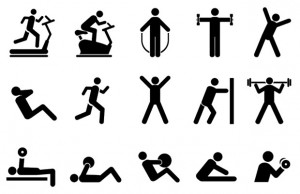As a college student, both exercise and grades are very important to me. A question struck me when I was thinking about whether there was any noticeable correlation between exercise and grades. I wondered whether regular exercise could cause my grades to improve? Before I dove into a discussion on whether the two are correlated, I took a moment to think of the ways that the two could be connected.
- Exercise could cause students grades to improve.
- There could be some third variable that contributed to both good grades and regular exercise such as an individual’s tendency to be self disciplined.
- Reverse could be ruled out if the passage of time between exercise and improvement of grades were controlled.
A study was conducted by faculty at Texas A&M University in order to try and identify if a correlation between exercise and grades existed. One thing that I found very interesting was that the paper opened by saying that all the students involved in the study gave informed consent before participating in the study. This is important because it ensured that the participants knew all possible outcomes before participating. All of the students who decided to participate were divided into two groups, experimental and control. Because this was an observational study, those conducting the study just surveyed to find out the students’ exercise habits and put those who did exercise into the experimental group and those who didn’t into the control group.
After looking at the data, there was no clear correlation between exercise and GPA. These researchers, however, continued to discuss that many researchers had found a clear correlation between the two. With so much evidence pointing towards a clear correlation between exercise habits and improved grades in other studies, it made me wonder if this field suffers from the file drawer problem. Perhaps university sponsored researchers are reluctant to publish data that contradicts a more popular view that exercise has a positive impact on grades because universities might want to encourage their student bodies to participate in regular physical exercise.
In another study published in the Journal of Exercise Psychology, researchers compared students’ scores on a fitness test to their scores on SAT reading and math. While this study yielded a very clear correlation between fitness and grades, the researchers even said that it was very possible that this correlation was caused by a third variable. If researchers wanted to rule out extraneous variables, they could continue to design more well controlled studies and increase the populations studied in order to create statistically significant bodies of data that could reduce the chances of the study showing a false positive.
My take away was that you might as well take time to schedule daily exercise. Perhaps the supposed predisposition of universities is a healthy one–that is that daily exercise is a positive habit in the long term.



I have always thought that a little bit of exercise has helped me focus. Releasing all the built up energy so that I can better focus has always been helpful. Believe it or not, Harvard Medical published this article explaining how when you exercise, the brain releases chemicals that help with focus and other cognitive functions. As simple and exercise is, it is only more of a reason to do that it may help your focus.
This is very interesting to me, because I always have the best intentions of exercising, but it often doesn’t happen. The main reason it doesn’t happen for me is that I frequently feel as though I have too much studying and homework to do, and that getting good grades was more important than exercise. That is what I am coming to college for, right? Anyway, if there’s even a chance that this could be beneficial to my academic performance, I suppose it is worth the time, although it would seem that the file drawer problem is plaguing this field as many of the popular articles you can find claim that it helps. I had to look a little bit to find this study that seems to agree with the one you found. https://cola.unh.edu/sites/cola.unh.edu/files/student-journals/Perspectives2014_PachecoExercise.pdfy
I am surprised that the results show no correlation between the two variables. When I was in high school, I had practice every day during the sports seasons, which was when my grades were best. I learned how to make efficient use of the little time I had by doing homework and studying. Since college students have so much time on their hands, I figured they most likely do not go to the gym very much and do not get much work done. Do you think the experiment would have been more effective if the causal variable was manipulated and people either had to workout or do nothing? After a specified time period, the grades would be compared between the two groups.
I agree there is certainly a correlation here, but it may not have to do with the exercise so much as any activity outside the classroom. Being more involved, at least for me personally, definitely keeps me on top of my work in regards to time management. When I have more time to sit around, I seem to procrastinate more and put off work. This article stresses the positives of extracurrilculars (like exercise) and how they do indeed impact performance in school.
http://classroom.synonym.com/extracurricular-activities-academic-grades-4906.html
Yeah, free time is definitely a major factor in procrastination. I often find myself saying “I have time to do that later” and putting things off until the last minute. One point from the article you posted that jumped out to me was the fact that playing on a sports team drills the message of attendance = success into athletes minds. Do you think that same type of message could be taught to those who don’t involve themselves in competitive activities or do you think it is only something that can be learned in a competitive environment?